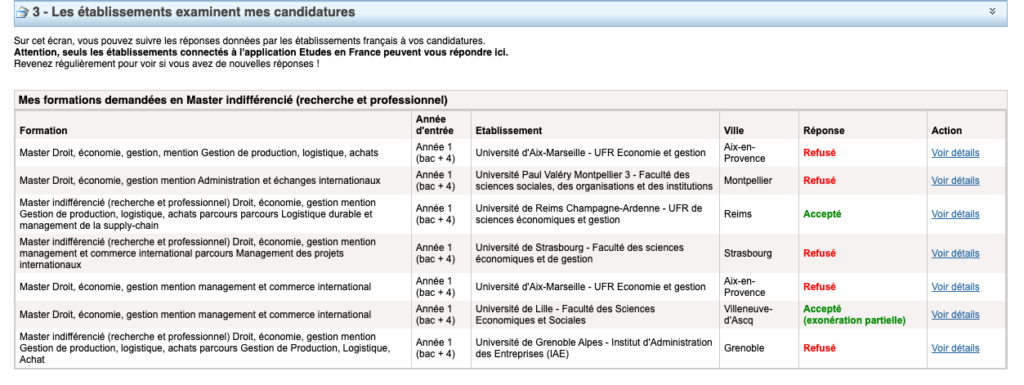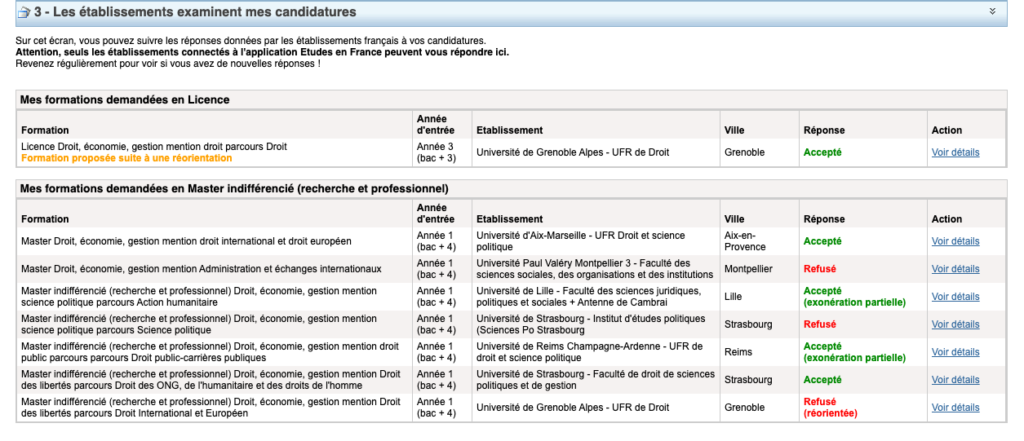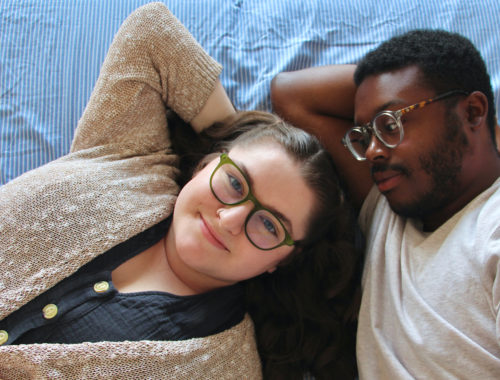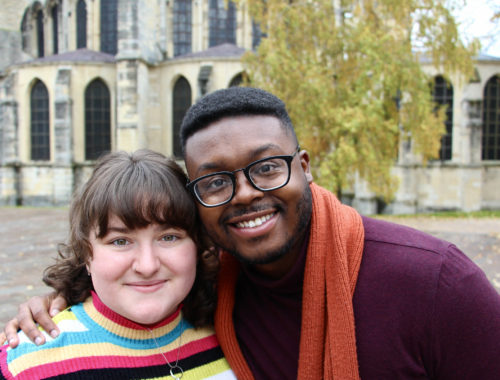
Applying for a Master’s Degree in France: How to Know If You’ll Be Accepted
Note: This information is accurate as of November 18th, 2020.
Applying for a master’s degree in France can be an involved and difficult process. There’s tons of paperwork to fill out, multiple accounts to create, and lots of people to contact. However, one of the most stressful things to deal with is wrestling with your own uncertainty about whether or not you will be accepted into a program.
“Applying for a Master’s Degree in France” is a series of articles aimed at helping foreign students, especially Americans, apply to master’s programs in France by providing the information they need all in one place. In today’s article, we will be using our own student profiles, acceptances, and rejections to give you an idea about your chances of getting into a master’s program in France.
Being accepted into a master’s program in France is not an exact science, and even including everything in your application that a specific program requires is not a guarantee that you will be accepted. Acceptances depend on many factors, including the admission committee members, the maximum capacity of the program, the profiles of other applicants, your previous schooling, and much more.
Our Profiles
As far as our personal master’s degree applications, Maria and I had pretty similar profiles. We went to high school together, attended the same university where we both majored in International Affairs and French, and even participated in the Teaching Assistant Program in France (TAPIF) together. Some of our strengths included the fact that we had both spent time living and working in France, we have a high competency in the French language, and we had both graduated from college with honors. Additionally, we submitted carefully crafted letters of recommendation and cover letters to further explain why we were good candidates for our desired programs.
On the other hand, there were some weak points in our applications. Although our undergraduate majors in International Affairs and French are somewhat connected to our master’s programs in Logistics and Public Law, respectively, they aren’t precisely the same fields of study. Furthermore, we didn’t have a lot of work experience in our desired fields. With these weaknesses in mind, we made it a point to highlight the strengths of our application while drawing attention to the relevance of our previous education and work experience in our cover letters. All in all, we think that our applications were pretty strong, however, we weren’t the perfect candidates.
Our University Responses


As you can see in the tables above, Maria and I applied to seven programs each. Most of the time, the responses were either a simple acceptance or refusal, but this was not always the case. For instance, Maria was offered a spot at the Université Grenoble Alpes in their Law program, but instead of for a master’s degree, the spot was for the final year of a licence, or bachelor’s degree. This situation, known as a réorientation, can happen when the admission committee deems you a good candidate for their school, but recognizes that you might not be prepared for their master’s program yet. You can also see that some of the school’s acceptances come with a small note that says exonération partielle. This note is in reference to the recently hiked school fees paid by foreign, degree-seeking students in France. The exonération partielle is a notification that you will be permitted to pay the same school fees as a French student.
At the end of the day, Maria and I are very thankful to have gotten into two of our top programs together at the Université de Reims Champagne-Ardenne. Of course we would have liked to get into all of the programs to which we applied, but, in reality, we only needed one common university to fulfill our dream of studying in France together.
Our main advice to future applicants is the following:
- Take advantage of the fact that you can apply to seven programs.
- Start your application early and make it as attractive as possible.
- Choose programs that are within reach based on your academic and professional history.
- Throughout the long process that is applying to a master’s degree in France, try to keep in mind that among the responses you receive, only one needs to be an acceptance to make your dream of getting your master’s degree in France come true.
We hope that this article has given you some insight into your chances of getting into your desired master’s programs in France. Make sure to leave us a comment if you have any questions about this article or this series.
Check out the other articles in our Applying to a Master’s Degree in France series:
- How to Choose a Program
- Important Documents You Need
- How to Complete the Online Application
- Detailed Application Timeline
- Campus France Phone Interview
- Accepting an Offer of Admission
Check out our video about why you should study in France!
You May Also Like

Studying in France as Americans: Old Chapters, New Experiences, and Relaxation Preparation
August 31, 2022
Important French University Abbreviations and Vocabulary You Need to Know
February 16, 2022


6 Comments
Kyle
I am applying to do the TAPIF program and then hopefully do my masters in France just like you guys! So I am following your posts closely. Really grateful for the information posted here!
Jalen & Maria
Thank you for following along, Kyle! We appreciate that. Don’t hesitate to share our blog/YouTube channel with anyone else who you think would be interested! Good luck with your journey! 😊
Katherine
Hi Jalen and Maria!
First thank you so much for blogging about your expereince applying and attending uni in France, it’s been a really comforting resource for me the past few months. I’ve recently been accepted to two grad programs, one of which says exonération totale. I havent been able to find any info on this, so I thought I’d see if you have any pointers. Trying not to get my hopes up that it means something like no tuition… also I’m wondering how much cost played a role in your choice of schools. I have been saving and was prepared to pay the hiked tuition, and while I prefer the program that accepted me with no exonération, I think saving those thousands would change the whole expereince cause I could potentially work less, travel more and just breath financially instead of being on a tight budget all the time.
Hoping to hear what you think and again I just appreciate your sharing your experience so much.
Merci d’avance,
Katherine
Jalen & Maria
Hello Katherine,
You’re welcome! Thanks for watching and reading our content. We are glad that it has been helpful for you. We have not seen the « exonération totale » notification before, however we haven’t heard of students not paying any tuition/fees unless they have gotten a scholarship. The best thing to do would be to email or call the program/school and ask them what they mean by it.
Cost played a massive role in our choice of schools to which we applied and ultimately from which we accepted offers. Additionally, the cost of living in different cities played a major role in our decisions on where to go. Like yourself, we had saved and prepared ourselves to pay the hiked tuition fees for foreign students, but were glad that we didn’t end up having to. As we were going to be living on savings, it was important to us to feel as financially comfortable as possible during our studies, which can be very stressful as a foreign student. Our schedules did not end up allowing us to work at all during the school year, further validating our financial choices. For an example master schedule, check out our article here: https://thefrancofile.net/what-does-a-typical-french-masters-degree-schedule-look-like/
Your choice of program will depend on your needs and wants, and you’ll really have to ask yourself the right questions. What is your long-term plan? Does one program help you get there more than the other? How so? Have you saved just enough for the first year of living in France, or will you be living on your savings for the entire degree? Would you be eligible for housing assistance here in France? Will you be working any required/optional internships that might be paid? Will family members or friends be sending you significant amounts of money throughout the year? These are the types of things you might want to consider while trying to make your decision. We hope this helps! Good luck!
Marlene
Hi Jalen & Maria. I’ve heard there are not many places for M1 in France. I’m pretty worried I will be rejected as I only have two choices (my husband works in Toulouse so I have to choose something there.
What are your suggestions? Do you know of anyone who tried applying the following year and succeeded?
Thanks 💓
Jalen & Maria
Hi, Marlene. We understand that the process can be nerve-wracking, and that you’re wondering if you’ll be accepted to a program. The best people to ask about your qualifications in relation to the programs you’re applying to are the program contacts. Therefore, if you’re really worried about being accepted, we suggest going directly to the source to find out whether your application is competitive. That way, you can either put your mind at ease, or you can start making changes for the next application cycle. The best time to reach out to these contacts would have probably been before you applied, but it could still be useful to see if there’s anyone you could chat with now. We don’t personally know anyone who has been rejected from a program and accepted the following year, but we have no reason to believe it would be out of the realm of possibilities. Good luck to you!